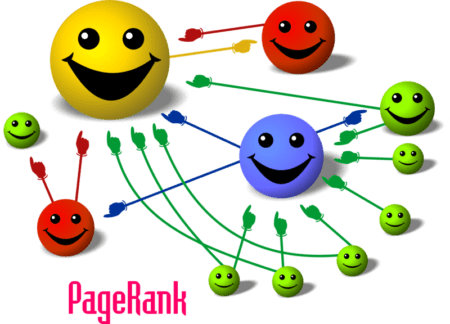
Google Pagerank is a simple scale from 0 to 10 (as well as n/a for very new pages) as it is an important factor in where your site appears in Google’s results a lot of effort is put into improving it by online marketing professionals.
Google Pagerank gets a lot of focus because of the fact it is easy to check and track, many over simplify the process of improving Pagerank though and many business owners think that it is the only basis for tracking SEO success: this isn’t the case and there is a lot more to SEO than building pagerank but it is still important and a good way to start for small businesses doing their own SEO in house.
Google use a page’s pagerank as one important factor in where it appears in results relative to other results, of course other factors such as relevance are important and so a page with a lower pagerank but more factors pointing towards being relevant to a keyword may appear above a page with higher pagerank.
It is important to remember that pagerank applies to only a page and not to a whole site so different pages can have different pageranks. Pagerank can be spread from page to page and between sites however so if you have a well-designed site most of your pages should have a similar pagerank, often with a slightly higher pagerank for the homepage or other key landing page. Pagerank spreads between sites as well because Google use pagerank to decide on the value of a link, a link from a high pagerank page will pass value to the pagerank of another page.
The exact value passed to each depends on the number of do follow links from a page so if a pagerank 3 page has three links it will pass a value of approximately 1 to each page, though other factors affect this too.
A do follow link is a link without a nofollow tag, a nofollow tag basically tells Google to ignore a link so no pagerank value is passed on so for SEO it is only do follow links that have value.
Google Pagerank doesn’t pass instantly and Google generally update pagerank only once every six months though they will be aware of links passing value before and may take the potential value into account for ranking in search results.
Google pagerank and therefore placements or ranking in Google’s search results can be improved in a number of ways and are an important part of SEO. Google do however look out for artificially created links and may ignore them or even penalize your website. The best links you can manually build are those from other high pagerank pages but which look natural and may well be part of a string of unique text such as a comment on a forum, if the comment and the original post are related to the page being linked to a lot more value is inherited as a result and this can also improve rankings for certain related keywords. Other sources of good quality links include blog comments and creating unique articles on other blogs and websites though not article banks.
The other option is to encourage organic links by creating link bait content: great interesting content that you can distribute through social media and then will be linked to by websites who simply think that your content is interesting. Whatever method you use remember that Pagerank isn’t everything and there is a lot more to SEO than link building and low pagerank sites regularly outrank high pagerank sites in results.

One Reply to “What You Need to Know About Pagerank”